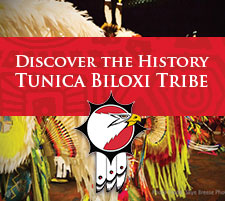Letter from the PAC Director
2017 was a tough year for many – natural disasters impacted many of our tribal members in a number of states, particularly in Texas and Louisiana. With hurricanes and historical flooding never seen before, the damage was catastrophic to members and nonmembers alike. My heart goes out to the families and businesses of our members who suffered great personal losses and tragedy due to these terrible events.
Interestingly enough, these awful happenings revealed the amazing spirit of our tribe. I witnessed first hand members banding together to reach out and assist members in all areas and states. It was so awesome to watch how we put aside any differences we may have in order to help out fellow tribal mem- bers who we know are in need. We came together to accomplish goals and overcome circumstances that were beyond our control.
Sometimes we often get so caught up in our political differences that we forget how strong we can be when we rally together. Political and philosophical disagreements are okay – in fact they make us stronger when we have healthy debates about the future of our tribe or policies that directly impact the well-being of our tribe. But that does not mean in the end we cannot come together for the good of all when the dust settles.
The political world has become so tough and personal at times that we donʼt allow ourselves to overcome the challenges that we face by being such a diverse community. We seem to push each other in to corners and donʼt allow for a common ground to be found. The incredible and selfless action that we showed in response to the natural disasters show that we can come together no matter what, when the safety and security of our people in on the line.
There is a role for political debate and disagreement in our tribe. It is important that we discuss, and yes even fight, over issues that we feel are most important to our people. What is more important is that we work just as hard to come together as we do on pushing for the things we care about. If we cannot come together as a one cohesive unit in the end, we will fail to accomplish the goals which we aspire to see come to fruition. When politics are not utilized for the betterment of our tribal nation, and are utilized for personal agendas or for a select group, the majority will suffer and we as a people will suffer overall.
The people of the Tunica Biloxi Tribe have overcome so much throughout history because in the end we have the security of knowing we have each other for support. We must continue to have that spirit of togetherness and we cannot let the political world destroy that which we have worked so hard for. What is most important to us and what should always happen is that we unite at critical times on significant issues.
This is key to make our tribe successful and securing the future that we want for our future generations. Letʼs make 2018 the year we allow healthy political debate to produce unity and I know that we can achieve the greatest goals together. We know that we can do it, as we have seen the response of our people when faced with tumultuous odds. We as a tribe have the ability to move forward and create a better future for each and every one within our nation.
Strength in Unity
Hereʼs a question I have been asked several times over the many years I have had the pleasure of working on behalf of theTunica-Biloxi Tribe of Louisiana: “So, Eric, ifthe Tunica-Biloxi Tribe is a sovereign government, isnʼt the federal government supposed to consult directly with our leaders before making decisions that will impact us?”According the letter of the law, the answer is yes. However, as there are over 560 tribal governments recognized by the United States as sovereign, it is impractical for every federal agency to interact and consult with each tribal government separately before making any significant decision. The gears of government, already creaky and slow, would grind to a halt as federal officials fanned out to collect input from tribes across the country - many of which are located in remote areas far from Washington, DC.
“Ok, I get it. But then, how can the Tunica-Biloxi have a greater voice in our dealings with Washington?”
The answer is twofold. First, the Tunica-Biloxi Tribal government is active in Washington. Your tribal leaders regularly travel to DC to interact directly with lawmakers and federal officials. They utilize
my help and the help of my colleagues to carefully craft their messages and time their meetings so the views and interests of the Tunica-Biloxi Tribe can break through the cacophony of voices that drive our
democratic system, Of course, we donʼt always get our way, but on issues that are particularly important to us, we make sure that we are heard.
Second, your tribal leaders are very active in tribal organizations like the United South and Eastern Tribes (USET). Unlike most tribal organizations, USET is essentially a council of governments. It provides an organized forum for the government leaders of all of the federally recognized tribes from Maine to Texas to regularly meet and reach consensus on a wide range of issues confronting Indian Countryʼs interactions with the non-Indian world. As a result, federal officials often look to USET first when they want to know how Indian Country is going to approach an issue. What this means is that
if we really want the Tunica-Biloxi voice to be heard, we need to be active both directly in Washington, and at USET. Going it alone would considerably weaken your voice and limit the tribeʼs ability to influence federal decision making.
“Yes, but what issues really matter? It seems like Washington is so far away and what they decide up there doesnʼt have a real impact on my life.”
Yes - it often seems that way, but donʼt be fooled. Although federal decisions often take time to reach implementation, they impact our lives in dramatic and important ways. Of course, the protection from state laws that allows the Tribe to have a casino is an important federal action that we can point to, but there are many decisions being made today that will also have a major impact. For example, the Department of Interior is currently in the process of rewriting the process by which a tribe can have and placed into trust. This is the process by which the tribe can gain additional land and add it to the reservation for economic development and other purposes. If they make poor decisions in DC, the process might not only hurt our ability to grow, but even worse, it might result in the potential loss of existing rights and protections. Similarly, new rules are being crafted concerning Native American housing programs, health care and education programs, and the protection of sacred sites. All of these issues ultimately impact the servies and programs that the Tunica-Biloxi can provide to its citizens.
So, whenever you find yourself asking why your tribal leaders are traveling to Washington, to a USET conference, or a meeting of the National Congress of American Indians, know that they are working hard to make your voice heard. Let them know if you have ideas to make these programs better. Give them your thoughts on what works and what doesnʼt. The Tunica-Biloxi Tribe is strongest when you find ways to agree with and support each other. The same is true for all tribal nations. There is real truth in the USET motto: “Because there is Strength in Unity.”
Eric Tober is a Partner at Cornerstone Government Affairs in Washington, D.C. He holds a B.A. from the University of Lafayette and an MBA from Georgetown University.





Political Update Courson Nickel, Bud Courson and Jim Nickel
Other than some minor tweaks and edits - Louisianaʼs gaming laws have remained pretty much unchanged for nearly a quarter of a century. An effort to make major changes to those laws may be underway in the upcoming 2018 Louisiana Legislative Session.
Before we discuss those potentially proposed changes letʼs take stock of the current Louisiana gaming landscape: There is still limits on the number of video poker truck stops and video poker machinges. And
there are still four horse tracks operating in Louisiana.
Make no mistake - gaming revenue is critical in Louisiana. Now, more than ever. In 2016 state revenue from gaming totaled $916 million - far exceeding the $581 million the state received from oil and gas revenues. Bottom line is Louisiana needs gaming revenue to operate and some powerful forces are pushing for more options. Here is what we are hearing being pushed by the riverboat industry.
First, riverboats want to be allowed to operate on dry land - essentially become land based. They argue they should not have to pay unnecessary and unneeded expenses related to operating a riverboat since they never sail. If they are successful in this effort they will surely ask for more gaming space - especially for more slot machines.(they are currently limited to 30,000 square feet of total gaming space)
Second - they want a break on taxes they pay for promotional money they send to potential gamblers to use their hotels and other related facilities. They claim these promotions bring in out of state dollars into
Louisiana.
And finally they are paying close attention to an anticipated Supreme Court decision on sports betting. If the decision (coming in April of 2018) is positive the boats will push for sports book gaming in all of their facilities.
TBIPAC Director of Political Affairs David Rivas, Jr. and Tunica Biloxi Tribal Leaders are watching these possible developments very closely and we are working to educate Louisiana Legislators on the potential impact these changes could have on employment and economic opportunities in their area. We will continue those efforts up to and during the 2018 Louisiana Legislative Session that begins in early March.
It is still unclear how other gaming operators (land bases casino, video poker operators, horse tracks and other tribes) view these potential changes. In addition to our work - TBIPAC and our tribal leadership will be
reaching out to find other potential allies in this debate.
Reserve Grand Champion Ed Myers - M&M Cookers & Grand Champion Don Canterbury - We Be Smokin

Traveling Trophy Gene Pruett - One Slice at a Time

Craig Smith Hot Ash Smokers

Adam Gautreau - Cajun Blaze BBQ

Perry Dunn - Pickinʼ & Grillinʼ

Awards Ceremony

Marilyn Riley volunteer at TShirt/ BBQ Plate Lunch Booth

1st Place Kids Que Hailey Landry

Peyton Manotas, Mitchell Pierce and Edwin Manotas Smokinʼ Coonasses

Shannon Sampson - The BBQ Bandits

Kirk Filipp -Czech Cherokee

Guessing Candy Game

TBIPAC BBQ Pits








